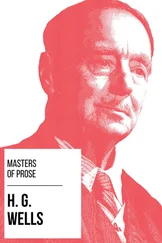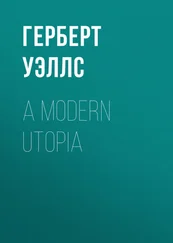H. Wells - A Modern Utopia
Здесь есть возможность читать онлайн «H. Wells - A Modern Utopia» — ознакомительный отрывок электронной книги совершенно бесплатно, а после прочтения отрывка купить полную версию. В некоторых случаях можно слушать аудио, скачать через торрент в формате fb2 и присутствует краткое содержание. Жанр: unrecognised, на английском языке. Описание произведения, (предисловие) а так же отзывы посетителей доступны на портале библиотеки ЛибКат.
- Название:A Modern Utopia
- Автор:
- Жанр:
- Год:неизвестен
- ISBN:нет данных
- Рейтинг книги:4 / 5. Голосов: 1
-
Избранное:Добавить в избранное
- Отзывы:
-
Ваша оценка:
- 80
- 1
- 2
- 3
- 4
- 5
A Modern Utopia: краткое содержание, описание и аннотация
Предлагаем к чтению аннотацию, описание, краткое содержание или предисловие (зависит от того, что написал сам автор книги «A Modern Utopia»). Если вы не нашли необходимую информацию о книге — напишите в комментариях, мы постараемся отыскать её.
A Modern Utopia — читать онлайн ознакомительный отрывок
Ниже представлен текст книги, разбитый по страницам. Система сохранения места последней прочитанной страницы, позволяет с удобством читать онлайн бесплатно книгу «A Modern Utopia», без необходимости каждый раз заново искать на чём Вы остановились. Поставьте закладку, и сможете в любой момент перейти на страницу, на которой закончили чтение.
Интервал:
Закладка:
Individual liberty in a community is not, as mathematicians would say, always of the same sign. To ignore this is the essential fallacy of the cult called Individualism. But in truth, a general prohibition in a state may increase the sum of liberty, and a general permission may diminish it. It does not follow, as these people would have us believe, that a man is more free where there is least law and more restricted where there is most law. A socialism or a communism is not necessarily a slavery, and there is no freedom under Anarchy. Consider how much liberty we gain by the loss of the common liberty to kill. Thereby one may go to and fro in all the ordered parts of the earth, unencumbered by arms or armour, free of the fear of playful poison, whimsical barbers, or hotel trap-doors. Indeed, it means freedom from a thousand fears and precautions. Suppose there existed even the limited freedom to kill in vendetta, and think what would happen in our suburbs. Consider the inconvenience of two households in a modern suburb estranged and provided with modern weapons of precision, the inconvenience not only to each other, but to the neutral pedestrian, the practical loss of freedoms all about them. The butcher, if he came at all, would have to come round in an armoured cart….
It follows, therefore, in a modern Utopia, which finds the final hope of the world in the evolving interplay of unique individualities, that the State will have effectually chipped away just all those spendthrift liberties that waste liberty, and not one liberty more, and so have attained the maximum general freedom.
There are two distinct and contrasting methods of limiting liberty; the first is Prohibition, “thou shalt not,” and the second Command, “thou shalt.” There is, however, a sort of prohibition that takes the form of a conditional command, and this one needs to bear in mind. It says if you do so-and-so, you must also do so-and-so; if, for example, you go to sea with men you employ, you must go in a seaworthy vessel. But the pure command is unconditional; it says, whatever you have done or are doing or want to do, you are to do this, as when the social system, working through the base necessities of base parents and bad laws, sends a child of thirteen into a factory. Prohibition takes one definite thing from the indefinite liberty of a man, but it still leaves him an unbounded choice of actions. He remains free, and you have merely taken a bucketful from the sea of his freedom. But compulsion destroys freedom altogether. In this Utopia of ours there may be many prohibitions, but no indirect compulsions—if one may so contrive it—and few or no commands. As far as I see it now, in this present discussion, I think, indeed, there should be no positive compulsions at all in Utopia, at any rate for the adult Utopian—unless they fall upon him as penalties incurred.
* * *
What prohibitions should we be under, we two Uitlanders in this Utopian world? We should certainly not be free to kill, assault, or threaten anyone we met, and in that we earth-trained men would not be likely to offend. And until we knew more exactly the Utopian idea of property we should be very chary of touching anything that might conceivably be appropriated. If it was not the property of individuals it might be the property of the State. But beyond that we might have our doubts. Are we right in wearing the strange costumes we do, in choosing the path that pleases us athwart this rock and turf, in coming striding with unfumigated rucksacks and snow-wet hobnails into what is conceivably an extremely neat and orderly world? We have passed our first Utopian now, with an answered vague gesture, and have noted, with secret satisfaction, there is no access of dismay; we have rounded a bend, and down the valley in the distance we get a glimpse of what appears to be a singularly well-kept road….
I submit that to the modern minded man it can be no sort of Utopia worth desiring that does not give the utmost freedom of going to and fro. Free movement is to many people one of the greatest of life’s privileges—to go wherever the spirit moves them, to wander and see—and though they have every comfort, every security, every virtuous discipline, they will still be unhappy if that is denied them. Short of damage to things cherished and made, the Utopians will surely have this right, so we may expect no unclimbable walls and fences, nor the discovery of any laws we may transgress in coming down these mountain places.
And yet, just as civil liberty itself is a compromise defended by prohibitions, so this particular sort of liberty must also have its qualifications. Carried to the absolute pitch the right of free movement ceases to be distinguishable from the right of free intrusion. We have already, in a comment on More’s Utopia, hinted at an agreement with Aristotle’s argument against communism, that it flings people into an intolerable continuity of contact. Schopenhauer carried out Aristotle in the vein of his own bitterness and with the truest of images when he likened human society to hedgehogs clustering for warmth, and unhappy when either too closely packed or too widely separated. Empedocles found no significance in life whatever except as an unsteady play of love and hate, of attraction and repulsion, of assimilation and the assertion of difference. So long as we ignore difference, so long as we ignore individuality, and that I hold has been the common sin of all Utopias hitherto, we can make absolute statements, prescribe communisms or individualisms, and all sorts of hard theoretic arrangements. But in the world of reality, which—to modernise Heraclitus and Empedocles—is nothing more nor less than the world of individuality, there are no absolute rights and wrongs, there are no qualitative questions at all, but only quantitative adjustments. Equally strong in the normal civilised man is the desire for freedom of movement and the desire for a certain privacy, for a corner definitely his, and we have to consider where the line of reconciliation comes.
The desire for absolute personal privacy is perhaps never a very strong or persistent craving. In the great majority of human beings, the gregarious instinct is sufficiently powerful to render any but the most temporary isolations not simply disagreeable, but painful. The savage has all the privacy he needs within the compass of his skull; like dogs and timid women, he prefers ill-treatment to desertion, and it is only a scarce and complex modern type that finds comfort and refreshment in quite lonely places and quite solitary occupations. Yet such there are, men who can neither sleep well nor think well, nor attain to a full perception of beautiful objects, who do not savour the best of existence until they are securely alone, and for the sake of these even it would be reasonable to draw some limits to the general right of free movement. But their particular need is only a special and exceptional aspect of an almost universal claim to privacy among modern people, not so much for the sake of isolation as for congenial companionship. We want to go apart from the great crowd, not so much to be alone as to be with those who appeal to us particularly and to whom we particularly appeal; we want to form households and societies with them, to give our individualities play in intercourse with them, and in the appointments and furnishings of that intercourse. We want gardens and enclosures and exclusive freedoms for our like and our choice, just as spacious as we can get them—and it is only the multitudinous uncongenial, anxious also for similar developments in some opposite direction, that checks this expansive movement of personal selection and necessitates a compromise on privacy.
Glancing back from our Utopian mountain side down which this discourse marches, to the confusions of old earth, we may remark that the need and desire for privacies there is exceptionally great at the present time, that it was less in the past, that in the future it may be less again, and that under the Utopian conditions to which we shall come when presently we strike yonder road, it may be reduced to quite manageable dimensions. But this is to be effected not by the suppression of individualities to some common pattern, [Footnote: More’s Utopia. “Whoso will may go in, for there is nothing within the houses that is private or anie man’s owne.“] but by the broadening of public charity and the general amelioration of mind and manners. It is not by assimilation, that is to say, but by understanding that the modern Utopia achieves itself. The ideal community of man’s past was one with a common belief, with common customs and common ceremonies, common manners and common formulae; men of the same society dressed in the same fashion, each according to his defined and understood grade, behaved in the same fashion, loved, worshipped, and died in the same fashion. They did or felt little that did not find a sympathetic publicity. The natural disposition of all peoples, white, black, or brown, a natural disposition that education seeks to destroy, is to insist upon uniformity, to make publicity extremely unsympathetic to even the most harmless departures from the code. To be dressed “odd,” to behave “oddly,” to eat in a different manner or of different food, to commit, indeed, any breach of the established convention is to give offence and to incur hostility among unsophisticated men. But the disposition of the more original and enterprising minds at all times has been to make such innovations.
Читать дальшеИнтервал:
Закладка:
Похожие книги на «A Modern Utopia»
Представляем Вашему вниманию похожие книги на «A Modern Utopia» списком для выбора. Мы отобрали схожую по названию и смыслу литературу в надежде предоставить читателям больше вариантов отыскать новые, интересные, ещё непрочитанные произведения.
Обсуждение, отзывы о книге «A Modern Utopia» и просто собственные мнения читателей. Оставьте ваши комментарии, напишите, что Вы думаете о произведении, его смысле или главных героях. Укажите что конкретно понравилось, а что нет, и почему Вы так считаете.












